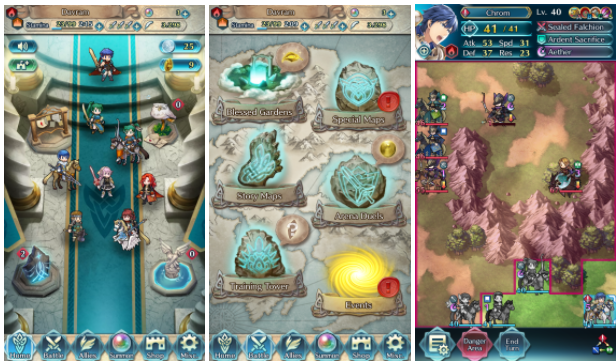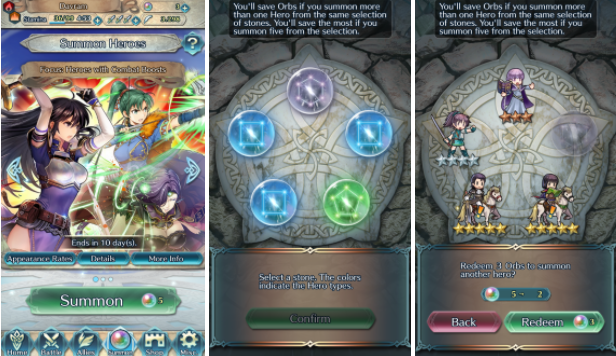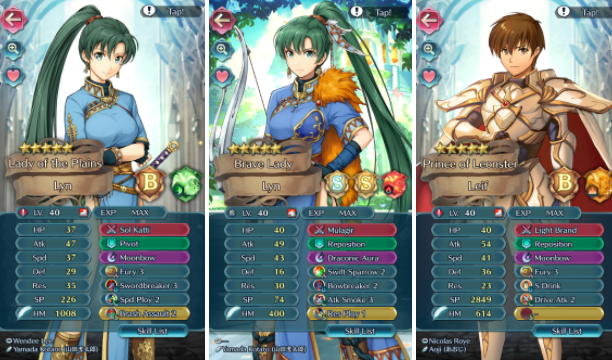Fire Emblem Heroes: The ‘Gacha’ Game That Got Me
I’ve never liked gambling. The idea of throwing money away, which has always been a scarce commodity, does not strike me as entertaining. The two times I have been inside casinos have left me with the kind of distaste normally reserved for murderers and residents of Florida. In short, gambling isn’t my cup of tea.
But video games are. Teatime for me is cozying up to a 100-hour RPG or slashing my way through a Dark Souls game (who am I kidding, I cheese those games with magic). But what if gambling and video games merged in such a way as to remove the distaste from the former by couching it in dressings of the latter?
This is where Nintendo’s first good mobile game comes into play because Fire Emblem Heroes is a gambling simulator with surprisingly deep strategic elements that I can’t stop playing.
My history with the Fire Emblem series is long and storied. Between Fire Emblem, Final Fantasy, and The Legend of Zelda, I have spent more time gaming than many current gamers have been alive. I started playing Zelda when it came out on the NES in the late 1980s, followed it up with Final Fantasy not long after, and as soon as it hit U.S. shores, I was a Fire Emblem junkie to the core. There is something about tactically maneuvering anime characters around, leveling them up, and promoting them into new, powerful classes that strikes almost every resonant chord that I have with video games.

When Fire Emblem Heroes came out last year, I met it with trepidation. The characters were mostly chibi-fied, there would invariably be a host of hidden costs because it was a mobile game, and the strategic grid, so vital to Fire Emblem games, was limited to a small square with only four playable characters. It was a recipe for disappointment. To my astonishment, it did not disappoint, and I found myself engaged with a mobile game for the first time ever. In fact, I enjoyed it more than I did some mainline Fire Emblem games – I’m looking at you, Shadow Dragon.
What I didn’t realize at the time was that I had also stumbled into my first “gacha” game.
The term gacha, which very appropriately sounds like “gotcha!” derives from two Japanese words. Gashapon and gachapon are onomatopoeic terms referring to the sound of turning a crank on a toy vending machine, with the “pon” standing for the ping of the toy capsule dropping into the prize box. Gacha games took over the Japanese mobile scene in the early 2010s and eventually made their way to the States. Fire Emblem Heroes is just one such phenomenon, taking its place alongside other popular titles like Final Fantasy Record Keeper, Puzzle & Dragons, and Monster Strike.
These gacha games operate as free-to-play, meaning users can download them at no cost and only voluntarily pay for in-game purchases. These purchases can often be cosmetic, but more often are used to enhance gameplay in some, often vital, way. In the case of gacha games, money nets players a higher chance to score valuable loot or powerful characters. But these chances are, like any method of gambling, extremely low. In the case of Fire Emblem Heroes, players have a six percent chance of pulling a “five-star” character of variable quality. Such games will often tempt players with free pulls or summons, and any good crack dealer knows a free taste only whets the appetite for more. Gotcha!
Fire Emblem Heroes is particularly insidious because it operates on the nostalgia and love that many of its players have for characters in the series (other gacha games focus on loot, which can be easier to resist). To date the roster of Fire Emblem Heroes is 244 different, distinct characters, with more on the way. The series as a whole likely approaches triple that, and with the popularity of the 3DS games and one coming on the Switch, that number will only increase. For completionists, this is an utter nightmare. The most important currency in Fire Emblem Heroes is the orb. 20 orbs allows players to summon five random heroes. Each hero has one of four shades, red, blue, green, and colorless (these operate on Fire Emblem’s classic triangle combat system – red beats green, green beats blue, and blue beats red). The color spread is completely random as well, meaning someone could summon five red characters, or one of every color plus an extra. Each color is further split up into weapon and movement type. Oh, and each character has a rarity, from three stars up to five, and while four-star units can help out in some way, once players are deep in the end-game nothing is sufficient but five-star versions of the strongest brawlers.

In short, it’s complicated, and I haven’t even gone into boons and banes, skill inheritance, team synergy, weapon refinement, or tier lists.
However, as many gamers can attest, complication is a whole lot of fun. Beneath the gacha mechanics and Nintendo’s love of whales (people who spend thousands of dollars on mobile games – yes, whales exist) lies a game with truly spectacular strategy and gameplay. Fire Emblem Heroes is fun, and not only that, it’s rewarding. Good players can expect to earn free orbs and feathers (items used to increase a characters rarity) just by using their noggins, and the satisfaction of conquering content that at first seems impassable is the biggest dopamine hit of all. There is an entire movement around getting the most from the game without spending a dime. It can be done. But it’s not easy, neither in practice, nor in spirit. For less cash than one might spend on a meal at some fast food restaurants, players can buy a set of 21 orbs. This is enough for a five-spread summon and a sweet, sweet chance to nab that five-star version of your favorite Fire Emblem character.
I have some experience with other gacha games. I spent almost a year playing Final Fantasy Record Keeper, which is itself a really deep and engrossing game and completely worth playing for any fans of the series. Fire Emblem Heroes is similar, differing only in its mechanic of summoning characters, where FFRK gives it characters away for free and utilizes a loot summoning system instead. These games dive into deep recesses that exist in the minds of many gamers, those dark places where collection obsession meets the need to prove oneself worthy. “If I had a five-star version of Zelgius, I could clear this specific map that simply cannot be cleared without his heavy defense and ability to counter from two spaces away.” The desire to spend a few dollars here and there can quickly become a habit, which, like many gambling addicts know, can lead to a messy place and a potential divorce.
I’m not ashamed to say that in the year or so that Fire Emblem Heroes has been out that I have likely spent close to one hundred bucks on the game, which is roughly what I would spend for a 3DS title and all of its DLC. That equates to less than ten bucks a month, which is a better price than most MMORPGs demand. Intelligent Systems, the developers of the game, continue to produce new content that further challenges players, and they are generous with their giveaways.
But it always feels like I am balanced on the edge of the knife, enjoying the game but also feeling pulled in to its seductive promise of more power, more characters, more everything. Is that tension worth the cost of a truly enjoyable experience? I could go play something on my PC or console and not have to deal with the challenge to my willpower, and I do, but Fire Emblem Heroes is mobile. I can play it anywhere, at any time, and it looks like I’m simply messing about on my phone. Add in one more layer to the insidious trifle that is Fire Emblem Heroes.
For now, I am content to play the game mostly free, and as long as I keep enjoying my time, I may even plunk down a few bucks now and again. I do wonder about the longevity of this type of video game, and how soon before courts or legislatures begin to take note of the gambling nature therein. Thanks to EA’s bungled attempts to cash in on Star Wars fan-dom with its many loot box fiascos, video games no longer fly under the hungry eyes of Big Brother. Gacha games could come under even more scrutiny than they already have, but for now they seem to be striking a balance.
Oh, and my favorite character is Lyn, and she was the first five-star character I pulled. Pure chance?


While I haven’t spent any money on this game, I am slightly addicted as well. The archer version of Lyn happens to be my favourite 5star (closely followed by Nowi and then Ike (legendary version).
Nice article 🙂